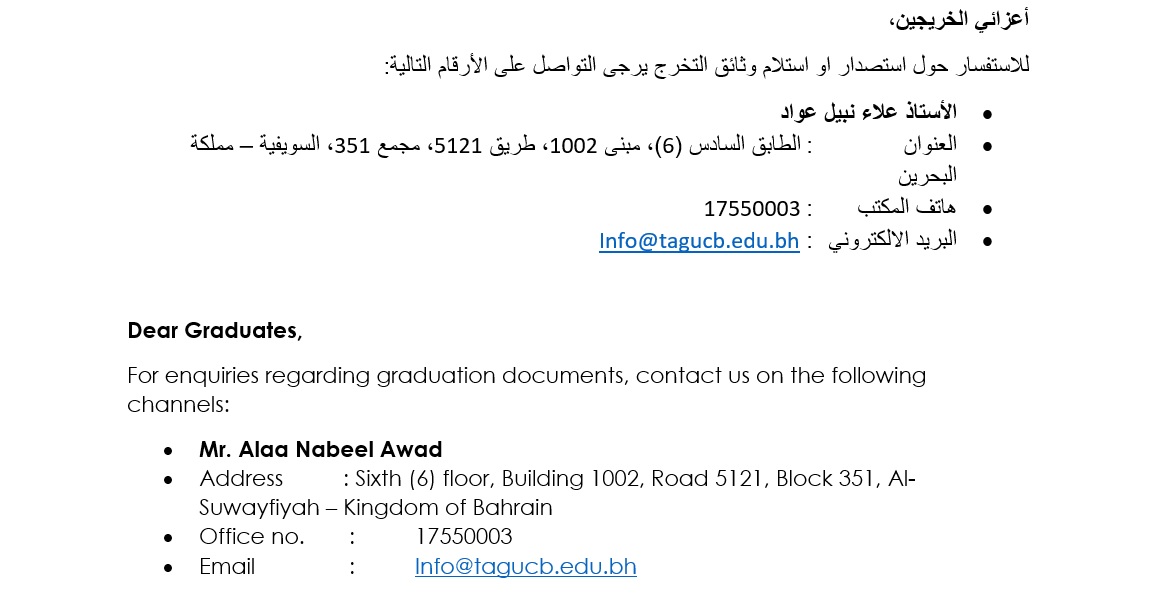
This page aims at raising awareness and communication in TAGUCB .
- معلم: Sameer Al-Zayani

This page aims at raising awareness and communication in TAGUCB .
Developing business communication skills is essential to build cohesive and effective teams, and if you know how to communicate well in your workplace you can minimize the risk of industrial problems to your business. This course focuses on providing students with the skills to connect with others and write various kinds of business documents.
This course offers participants concepts, trends, technical characteristics and management implications on information systems employed in managing human resources.
This course explores the basic functions of technology supporting the users (HRM) interface, management of data resources in HRM functions, nature of database contained in HRIS and its impact on the ability of management to meet challenges and effectively make decisions.This course explores the dynamics of interpersonal behavior and the impact on organizational effectiveness. In this course students are exposed to oneself dynamics and oneself to others dyadic dynamics and oneself to the overall organization dynamics.
The student are exposed to issues and challenges accompanied by the practice of management in human-based system. Moreover, Discuss the major themes in human relations considering the major forces influencing workers behavior.
In this course, Major themes of workers interpersonal behavior are scoped targeting organizational commitment and organizational loyalty.This
course aims to introduce the students to the Management Information Systems
(MIS) and its application in organizations. It provides an overview of MIS
within a business context with emphasis on MIS core principles as they relate
to management and organization theories.
The course should provide the student with knowledge of the core principles
of MIS, focusing on breadth rather than depth of knowledge, the role of MIS in
enhancing business processes and management decision making across the
enterprise, and the core principles of process of building and managing systems
in organizations. Topics such as: the concept of information, characteristics
of information, Systems theory, organizations as systems, MIS definition, MIS
components , MIS functions, The MIS and the value chain , The evolution of MIS,
The MIS and the company infrastructure, organizational structure, MIS
categories, managerial usage of MIS, classifying MIS and functions, MIS and
business strategy, Information technology infrastructure, MIS design,
management, maintenance and control, electronic commerce, and ethical issues related
MIS will be covered in class.
This course “Knowledge Management” introduces basic concepts and ideas on knowledge acquisition, creation and externalization in modern organization.
The tools and techniques for knowledge acquisition, assessment, evaluation, management, organization and dissemination are applied to business situations. Topics include knowledge taxonomies, knowledge management life cycle, SECI model and its application, KM solutions, cross-cultural issues in KM. In discussing these issues, the students acquire deeper understanding of knowledge phenomenon; develop their analytical skills for diagnostic of organization intellectual ability as well as managerial skills for knowledge based strategy implementation.This course “Knowledge Management” introduces basic concepts and ideas on knowledge acquisition, creation and externalization in modern organization.
The tools and techniques for knowledge acquisition, assessment, evaluation, management, organization and dissemination are applied to business situations. Topics include knowledge taxonomies, knowledge management life cycle, SECI model and its application, KM solutions, cross-cultural issues in KM. In discussing these issues, the students acquire deeper understanding of knowledge phenomenon; develop their analytical skills for diagnostic of organization intellectual ability as well as managerial skills for knowledge based strategy implementation.This course explores the importance of human resources as a key business factor and core competency. Participants are exposed to perceptive of human as a resource that can be changed, differentiated and satisfy customers. The students are exposed to knowledge in the development including manpower planning, productivity, career path, training, workforce culture and innovation & creativity.
The participants will be able to recognize the importance of developing human resources to assure development in all other resources, production factors and effectively manage organizations in a complex environment.